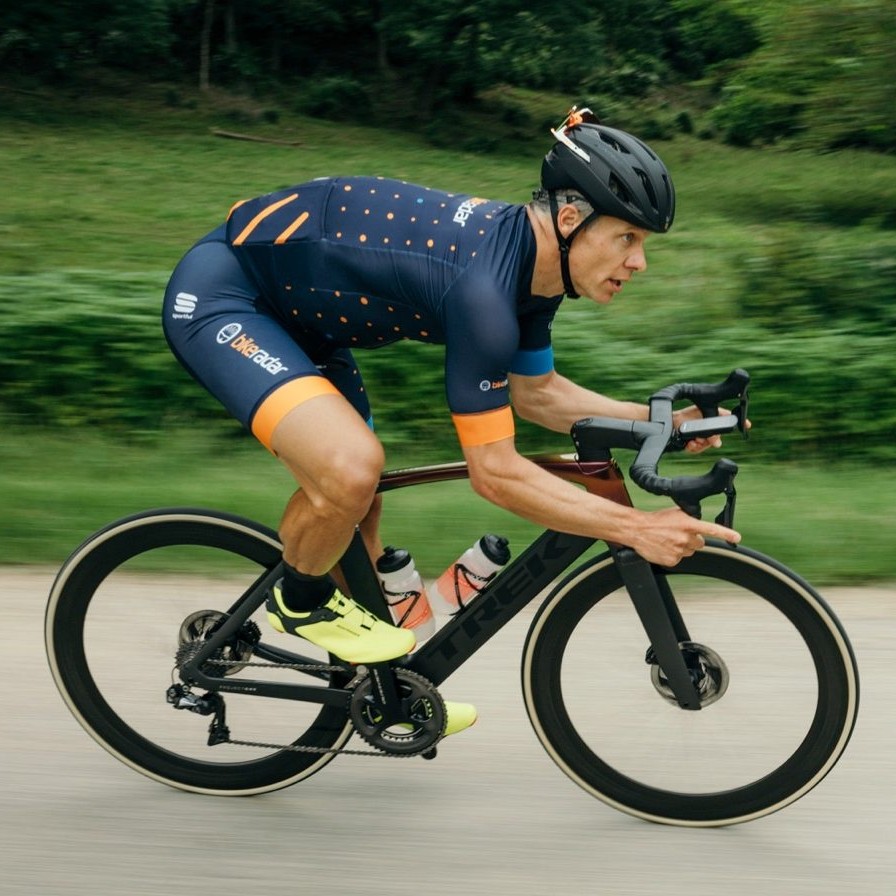Although tardy to the gravel game, Trek now has a legitimate contender with the Checkpoint, which boats 45mm tire clearance, mounts for four bottles, racks, bags and fenders, and the rear IsoSpeed Decoupler for smoothing out the ride.
I gently heckled Trek for its recent Domane Gravel (read: standard Domane road bike with gravel tires squeezed in), but the new Checkpoint series of seven bikes has answered the questions I raised. Here are my thoughts after a few rides on the top-end Trek Checkpoint SL 6.
- Trek goes all in on gravel with Checkpoint
- 8 great gravel bikes from NAHBS 2018
- 2017: a year in gravel tech
Trek Checkpoint first ride
Trek Checkpoint SL 6 highlights
- Rear IsoSpeed Decoupler (non-adjustable)
- Mounts for three water bottles on 49, 52 and 54cm frames; four bottles on 56, 58 and 61cm frames
- Clearance for 45mm tires, but comes with Schwalbe G-One All-Round TLEs
- Shimano Ultegra R8020 hydraulic group
- Adjustable dropouts for 425–440mm chainstays
- 50/34t, 11-34t gearing

Trek Checkpoint SL 6 ride quality and ability
While Trek previously put forth the Domane Gravel endurance road bike as a gravel machine, many riders argued that the company's Boone and Crockett cyclocross models were actually closer to the ideal gravel rigs. And, in fact, Trek largely poached the Boone's geometry — with a slightly lower bottom bracket and a slightly higher stack — for the Checkpoint, while borrowing the adjustable dropouts from the alloy Crockett.
Two things primarily drive how a bike handles: its geometry and its tires and wheels.
The Checkpoint SL 6's geometry feels like a steady endurance road bike; the angles aren't steep enough to feel skittish on choppy dirty descents but not so slack as to feel sleepy or lifeless.

Trek has long been a fan of the low bottom bracket (also used on the Domane) for the reason that it adds to a planted, stable feel. ’Cross bikes, although trending lower, have to have a higher BB for off-camber pedaling (or, arguably, barrier-hopping ability for the brave).
The extendable chainstays can make the bike even more stable in the fully extended position, for those who want to load up the rig for bikepacking. I like long rides, but, frankly, I'd rather do a big ride on a light bike and sleep inside than lug a laden bike around with my bedding. That is to say — I haven't tested the Checkpoint SL 6 as a long, loaded mule!
If you are so inclined, though, Trek provides mounts for fork-mounted bags, a rear rack, a top tube bag and fenders. And of course, you can strap on a handlebar bag or clamp on a big seatpost bag, too.

In the short chainstay position the Checkpoint feels similar to the Boone, but with a slightly taller front end. The main similarity is the bump-smoothing IsoSpeed Decoupler, which allows not only the seatmast but the seat tube to flex under load. Funny name aside, this is A Good Thing for gravel bikes.
Finally, the tires.
It's all about the tires! While the Bontrager Paradigm Disc Comp wheels — and more important, the frame — can handle between 28 and 45mm tires, Trek specs Schwalbe's G-One All-Round 35mm tubeless tires.
For me as a roadie, riding on mostly dry dirt roads and tame trails, the G-One is an excellent option. It's relatively fast on pavement and feels plenty grippy and cushiony to me on dirt. For some of my mountain biking colleagues, the G-One feels too skinny, thin and slick.
To each their own, and with the Checkpoint — unlike the Domane Gravel — you can go much bigger, if you like.

A lot of my gravel rides are actually paved-road-and-gravel rides, piecing together bits and pieces for fun and traffic avoidance. Again, with road bikes as my default, bigger gravel tires feel slow on pavement. All that to say, I'm happy with the G-Ones, but you may want to tailor your treads to your local riding.
Trek Checkpoint SL 6 limiters
I have a two-point wish list for my ideal Checkpoint bike. As a roadie nerd I'd like to be able to pop on my Stages power meter. That's not an option here, because left-crank clearance is super tight.
And second, I'd like to see front IsoSpeed on the Checkpoint. While nowhere near as dramatic in look or effect as a 30mm Lauf leaf-spring fork or Specialized's FutureShock spring, the front IsoSpeed does make a little difference. I suspect that will come in an SL 7 model.

Some gravel riders might like to see a 1x version with a clutch derailleur. SRAM's Force1 rear derailleur does make for a notably quieter drivetrain on many gravel bikes, as it largely prevents chainslap. The Checkpoint's dropped right chainstay largely dodges this issue, though.
Personally, I like Shimano groups and I like having two chainrings. As a heavier rider in the Rocky Mountains I use and appreciate each and every one of the 22 gears on bikes like the Checkpoint SL 6.
Bottom line: a fully capable gravel grinder
The Trek Checkpoint SL 6 is the top model of seven in the Wisconsin company's brand-new gravel line. Substantial tire clearance and storage mounts check the main boxes, and Trek's IsoSpeed Decoupler fortifies the bike's position as a legitimate gravel bike.
The geometry feels right to me for mixed-media adventures, as do the fast G-Ones for Colorado riding. But, crucially, if you want more cushion for your pushin', you can run up to 45mm tires here.
Stay tuned for a full review.
















